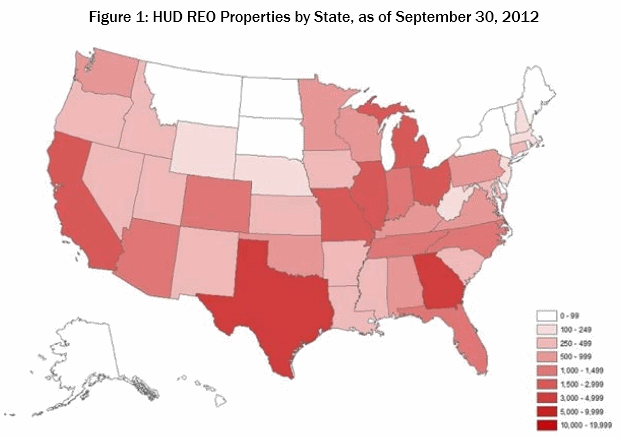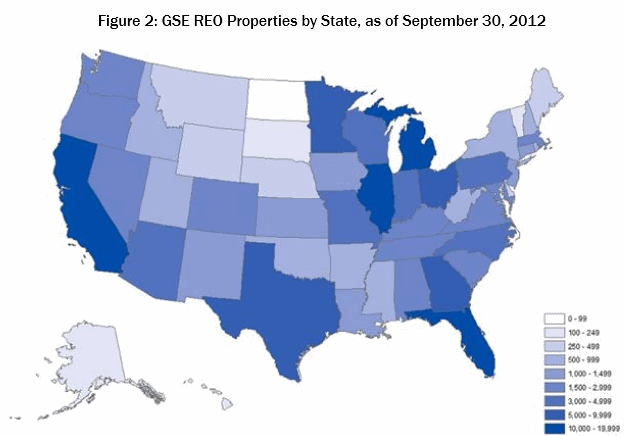Blog

REO Could Become A Serious Problem For HUD/GSEs
<pAsrnthe housing crisis unrolled the Department of Housing and UrbanrnDevelopment (HUD) and the two government sponsored enterprises (GSEs)rnFreddie Mae and Fannie Mae came into possession of more and morernproperties thorugh foreclosure. As ofrnSeptember 30, 2012, HUD held 37,445 foreclosed properties (REO) whilernthe GSEs held 158,138. In addition, the “shadowrninventory”-residential loans at least 90 days delinquent-totaled 1,708,033 properties, roughly 8.7 times the size of the HUD and GSErnREO inventories combined. Even a fraction of the shadow inventoryrnfalling into foreclosure could considerably swell HUD and GSErninventories of REO properties.</p<p </p
</p
 </p<pBecause of thernvolume of this current and potential REO the Offices of InspectorrnGeneral (OIG) for both HUD and the Federal Housing Finance Agencyrn(FHFA) (conservator of the GSEs) recently produced a report on howrnHUD and the GSEs are managing and disposing of it.</p<pHUD and the GSEsrnhave created infrastructures to manage and sell their REO and, whilernthese differ among the entities, all involve the use of extensivernnetworks of contractors to perform management tasks to: securernproperties to avoid theft, vandalism, and unauthorized use;maintainrnand repair properties as needed;pricernproperties appropriately through broker price opinions or appraisalsrn and satisfactory promotional efforts; and sellrnproperties to homeowners or investors within a reasonable period.</p<ul</ul<pLong before thernhousing crisis, HUD outsourced the disposition of its REO inventory tornprivate contractors under its Management and Market (M&M)rnprogram. These contractors are responsible for property activityrnboth pre- and post-conveyance, property management, marketing,rnaccounting and reconciliation, and oversight monitoring. Dispositionrnof the REO is administered through Homeownership Centers in Atlanta,rnDenver, Philadelphia, and Santa Ana, each of which is responsible forrna given geographic area.</p<pWithout getting intornthe alphabet soup of HUD management, a manager is assigned to eachrnproperty to inspect and clean out the property and order anrnappraisal. If the property is cleared for sale it is listed for 180rndays and if not sold within this time frame is offered to localrngovernment. If there is an acceptable offer the manager does thernnecessary title search and other work and clears it for closing. </p<p ThernGSEs also manage their REO in inventories using a series ofrncontractors:</p<ul<liAssetrnmanagement firms which direct certainrnREO contractors in the performance of day-to-day property managementrnresponsibilities.</li</ul<ul<liRealrnestate brokers who may, in addition to their marketingrnresponsibilities, manage portions of the REO inventory. </li</ul<ul
</p<pBecause of thernvolume of this current and potential REO the Offices of InspectorrnGeneral (OIG) for both HUD and the Federal Housing Finance Agencyrn(FHFA) (conservator of the GSEs) recently produced a report on howrnHUD and the GSEs are managing and disposing of it.</p<pHUD and the GSEsrnhave created infrastructures to manage and sell their REO and, whilernthese differ among the entities, all involve the use of extensivernnetworks of contractors to perform management tasks to: securernproperties to avoid theft, vandalism, and unauthorized use;maintainrnand repair properties as needed;pricernproperties appropriately through broker price opinions or appraisalsrn and satisfactory promotional efforts; and sellrnproperties to homeowners or investors within a reasonable period.</p<ul</ul<pLong before thernhousing crisis, HUD outsourced the disposition of its REO inventory tornprivate contractors under its Management and Market (M&M)rnprogram. These contractors are responsible for property activityrnboth pre- and post-conveyance, property management, marketing,rnaccounting and reconciliation, and oversight monitoring. Dispositionrnof the REO is administered through Homeownership Centers in Atlanta,rnDenver, Philadelphia, and Santa Ana, each of which is responsible forrna given geographic area.</p<pWithout getting intornthe alphabet soup of HUD management, a manager is assigned to eachrnproperty to inspect and clean out the property and order anrnappraisal. If the property is cleared for sale it is listed for 180rndays and if not sold within this time frame is offered to localrngovernment. If there is an acceptable offer the manager does thernnecessary title search and other work and clears it for closing. </p<p ThernGSEs also manage their REO in inventories using a series ofrncontractors:</p<ul<liAssetrnmanagement firms which direct certainrnREO contractors in the performance of day-to-day property managementrnresponsibilities.</li</ul<ul<liRealrnestate brokers who may, in addition to their marketingrnresponsibilities, manage portions of the REO inventory. </li</ul<ul
Propertyrnmaintenance companies and repair contractors who do essentialrncleaning, repairs, and maintenance. </p</li</ul<ul<liAppraisersrnand broker price opinion firms which help the GSEs determine thernvalue and listing prices of the properties.</li</ul<pWhilernthe burden of managing these REO inventories is significant enough,rnthe GSEs and HUD must also pay attention to their "shadowrninventories,” that is properties with mortgages more than 90 daysrndelinquent but which are not yet in foreclosure which, as statedrnabove, have the potential to exponentially expand those inventories.</prn<pHUDrnand the GSEs have taken several steps to shrink their REOrninventories. FHA, HUDs housing agency, uses itsrnOffice of Assets Sales which was established in 2001 to coordinaterndisposition of single family and multifamily mortgage notes. Thesernnote sales began as a pilot in 2010 and have resultedrnin the sale of nearly 2,400 single family loans as of April 2013. Notes are sold competitively at a market-determined price generallyrnbelow the outstanding principal balance to purchasers who agree torndelay foreclosure for at least six months. This allows the borrowerrna chance to get help from the loan servicer to avoid foreclosure.</p<p InrnSeptember 2012, FHA enhanced the program to include pools ofrnexpanded size and use criteria; the revamped program is referred tornas the Distressed Asset Stabilization Program. The first offeringsrnfrom the Distressed Asset Stabilization Program occurred in Septemberrn2012 with the latest offering conducted in March 2013. As of Aprilrn2013, the program has resulted in the sale of nearly 26,000rnmortgages. Another offering is planned for June 2013 with anrnanticipated sale of 15,000 to 20,000 loans.</p<pInrnFebruary 2012, FHFA directed Fannie Mae to launch a pilot REOrndisposition program and bids were solicited from qualified investorsrnto purchase and then rent for a specified period about 2,500 of itsrnforeclosed properties in geographically concentrated areas across therncountry. Investors were qualified to bid after an extensive reviewrnof their financial strength, asset management experience and localrnexpertise. FHFA has targeted especially hard hit areas such asrnAtlanta, Phoenix, and parts of Florida for the program and severalrnrounds of successful sales have been conducted. </p<pThernFHFA OIG said that since becoming their conservator FHFA hasrnconsistently listed the large inventories of the GSEs as a criticalrnconcern yet did not conduct targeted examinations or other focusedrnreviews until 2011. FHFA-OIG subsequently audited FHFA’s oversightrnof the GSE’s REO management and marketing and found they had takenrnpositive supervisory steps but needed to supplement these in thernfuture with more comprehensive risk assessment of, for example, thernshadow inventory. </p<pOIGrnsays it plans future assessments of the REO management processrnincluding matters such as securing the property, maintenance,rnvaluation, marketing, and sale and is considering several evaluationsrnof FHFA’s oversight of the GSE’s REO activities with a focus on theirrnability to handle future workloads and mitigate adverse effects onrnhomeowners and communities. </p<pFHFArnOIG will also assess Fannie Mae's pilot REO program if FHFA decidesrnto implement the sale-rental model on a wider scale. That assessmentrnmay include whether the program is achieving its expected outcomesrnand whether it is more cost effective to proceed with the modelrnrather than make sales through the traditional retail channel. OIGrnmay also look at the qualities of the controls to vet potentialrninvestors and the GSEs’ compliance with the controls and theirrnmonitoring and enforcement of investor compliance with the programsrnrules. </p<pFHFA-OIGrnalso plans to assess FHFA's oversight of single-family propertyrninspections at the GSEs, which are required at various points in thernmortgage servicing process, including upon delinquency, inrnforeclosure, and while managing and disposing of REO. Theserninspections should determine the overall condition of the property,rnsecurity of the house, occupancy status, maintenance and capitalrnrepair requirements, neighborhood conformity, and other relatedrninformation. Inspectors must be qualified to perform therninspections.</p<pWithrnthis audit and evaluation strategy, FHFA-OIG believes that it will bernwell positioned to determine whether FHFA is monitoring the GSEs’rnefforts to mitigate REO risks and costs and the negative impacts ofrnforeclosures on communities and to evaluate the effectiveness of therncontrols associated with the REO pilot program controls. </p<pThernOIGs' report concludes by saying that REO management and dispositionrnare challenging tasks and are likely to become more so as shadowrninventory becomes REO and substantial attention must continue to bernpaid to the manner in which HUD, FHFA, and the GSEs handle suchrnissues.
All Content Copyright © 2003 – 2009 Brown House Media, Inc. All Rights Reserved.nReproduction in any form without permission of MortgageNewsDaily.com is prohibited.
Latest Articles
By John Gittelsohn August 24, 2020, 4:00 AM PDT Some of the largest real estate investors are walking away from Read More...
Late-Stage Delinquencies are SurgingAug 21 2020, 11:59AM Like the report from Black Knight earlier today, the second quarter National Delinquency Survey from the Read More...
Published by the Federal Reserve Bank of San FranciscoIt was recently published by the Federal Reserve Bank of San Francisco, which is about as official as you can Read More...

Comments
Leave a Comment